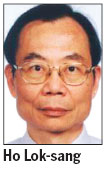Some lessons should be learned from the HKMEx fiasco
Updated: 2013-05-28 07:11
By Ho Lok-Sang(HK Edition)
|
|||||||

The Hong Kong Mercantile Exchange (HKMEx) has had a surprisingly short life. It was only in May 2011 that trading activities on the exchange first took place. When it was launched in 2008 there was much fanfare. Among those attending the event was Financial Secretary John Tsang Chun-wah who said there was "a huge opportunity for Hong Kong to develop a commodities futures market". In March 2009, HKMEx appointed Albert Helmig, a former vice-chairman of NYMEX, as president of the exchange to lead day-to-day operations of the bourse.
Hong Kong had been rated among the top three global financial centers in the Global Financial Centre Index report several years in a row. Geographically located on the doorstep of the world's most vibrant economy, the Chinese mainland, it may seem natural for Hong Kong to develop a mercantile exchange. If the Chicago Mercantile Exchange can do it, why can't Hong Kong? If the London Metal Exchange can command trading volumes that are the envy of the world - more than 80 percent of global trade in metal futures and a trading volume of $15.4 trillion last year, why can't Hong Kong grab, say, one-tenth of the market, which would have made survival not a problem at all.
On the mainland, the Shanghai Metals Market was established in 1992. It is already the largest non-ferrous metals futures exchange in the mainland and the third-largest exchange of its kind in the world. The HKMEx seems to be so natural a development of a leading global financial center that its demise looks the more puzzling!
It was Feb 13 last year when HKMEx celebrated its trading of gold and silver futures at a cumulative total of over 1 million contracts, representing turnover of more than $50 billion. But instead of continuing to rise, trading volumes dwindled, and it became increasingly clear that they were too low to sustain the continuing operation of the exchange.
While the HKMEx was struggling for survival, the Chinese Gold & Silver Exchange Society, which offers trading in precious metals in the spot market, was doing fine. The society has a history dating back to 1910. This exchange has been the predominant player, offering local and international investors a platform where they could exploit gold as a vehicle of investment, speculation, hedging and arbitrage. In principle, the existence of a vibrant spot market for gold and silver offers excellent prospects for an equally vibrant futures market.
Unfortunately, economies of scale and "increasing returns to scale" are of utmost importance to the success of financial product markets. Economies of scale, means there has to be a sufficient volume before all the investment in infrastructure can be justified. For example, the trading infrastructure must be reliable and be capable of coping with a sudden increase in volumes. Thin volumes cannot carry the cost. The HKMEx occupies over 47,000 sq ft at Cyberport, and this is costly to maintain and to rent. Increasing returns to scale means that as the scale of operation increases there will be increasing cost savings and increasing efficiency. This means that a platform that is successful will likely become increasingly successful, while a platform that is not successful will likely face increasing difficulties.
This is exactly the reasoning behind the Hong Kong Exchanges and Clearing Ltd's (HKEx) acquisition of the London Metal Exchange. It is just much too costly and too difficult to compete for market shares with existing successful exchanges.
Still, the Shanghai Metals Market (SMM) is a tremendous success. This has however to be seen in the light of an industrial need for such a market on the mainland, and the excellent timing. It was established in 1992, at a time when the Chinese mainland was rapidly industrializing yet much less integrated with the rest of the world. Even the renminbi was then still running on a two-track system. Industrial operations in the mainland had no access to any hedging facility to cover their metal needs anywhere except through the SMM. The SMM met a true need. This made it possible for the SMM to attract a large number of customers. By the time they signed up and started trading on the SMM, they would not easily switch to other exchanges.
In contrast, Hong Kong's foray into the metals futures market did not begin until 2008, when the HKMEx was first proposed, and actual trading operations did not begin until 2011. A good question is: since it would have been much more cost-effective for the HKEx to introduce a commodities futures exchange than to start a brand new exchange, why did it not find it worthwhile to introduce commodities futures? If the HKEx thought commodity futures did not have much of a future in Hong Kong, why would a brand new exchange be more successful? The Financial Services Development Council is well advised to take lessons from the HKMEx fiasco when it explores the future development of Hong Kong's financial markets.
The author is director of the Center for Public Policy Studies at Lingnan University.
(HK Edition 05/28/2013 page1)